
Counterintelligence (counter-intelligence) or counterespionage (counter-espionage) is any activity aimed at protecting an agency's intelligence program from an opposition's intelligence service. It includes gathering information and conducting activities to prevent espionage, sabotage, assassinations or other intelligence activities conducted by, for, or on behalf of foreign powers, organizations or persons.
In the United States, a special agent is an official term used to refer to an investigator or detective for a federal or state government or independent agency, who primarily serves in criminal investigatory positions. Additionally, many federal and state special agents operate in "criminal intelligence" based roles as well. Within the U.S. federal law enforcement system, dozens of federal agencies employ federal law enforcement officers, each with different criteria pertaining to the use of the titles Special Agent and Agent. These titles are also used by many state level agencies to refer to their personnel.

The United States Naval Criminal Investigative Service (NCIS) is the primary investigative law enforcement agency of the U.S. Department of the Navy. Its primary function is to investigate major criminal activities involving the Navy and Marine Corps, though its broad mandate includes national security, counterintelligence, counterterrorism, cyberwarfare, and the protection of U.S. naval assets worldwide. NCIS is the successor organization to the former Naval Investigative Service (NIS), which was established by the Office of Naval Intelligence after the Second World War.

The Air Force Office of Special Investigations is a U.S. federal law enforcement agency that reports directly to the Secretary of the Air Force. OSI is also a U.S. Air Force field operating agency under the administrative guidance and oversight of the Inspector General of the Department of the Air Force. By federal statute, OSI provides independent criminal investigative, counterintelligence and protective service operations worldwide and outside of the traditional military chain of command. Proactively, OSI identifies, investigates, and neutralizes serious criminal, terrorist, and espionage threats to personnel and resources of the Air Force, Space Force, and the U.S. Department of Defense, thereby protecting the national security of the United States.
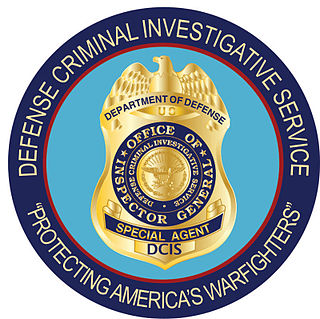
The Defense Criminal Investigative Service (DCIS) is the criminal investigative arm of the Office of Inspector General, U.S. Department of Defense. DCIS protects military personnel by investigating cases of fraud, bribery, and corruption; preventing the illegal transfer of sensitive defense technologies to proscribed nations and criminal elements; investigating companies that use defective, substandard, or counterfeit parts in weapon systems and equipment utilized by the military; and stopping cyber crimes and computer intrusions.
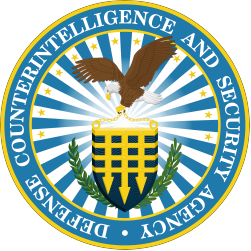
The Defense Counterintelligence and Security Agency (DCSA) is a federal security and defense agency of the United States Department of Defense (DoD) that reports to the Under Secretary of Defense for Intelligence. DCSA is the largest counterintelligence and security agency in the federal government and is responsible for providing personnel vetting, critical technology protection, counterintelligence, training, education and certification. DCSA services over 100 federal entities, oversees 10,000 cleared companies, and conducts approximately 2 million background investigations each year.
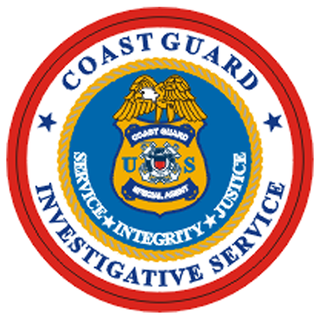
The Coast Guard Investigative Service (CGIS) is a division of the United States Coast Guard that investigates crimes where the U.S. Coast Guard has an interest. It is composed of civilian (GS-1811), active duty, reserve enlisted, and warrant officer special agents.
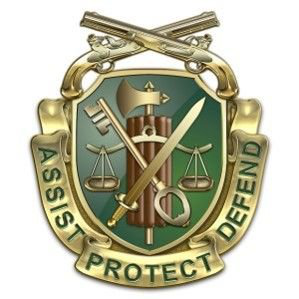
The United States Army Military Police Corps (USAMPC) is the uniformed law enforcement branch of the United States Army. Investigations are conducted by Military Police Investigators under the Provost Marshal General's Office or Special Agents of the Department of the Army Criminal Investigation Division (CID).

Coast Guard Intelligence (CGI) is the military intelligence branch of the United States Coast Guard, and a component of the Central Security Service of the United States Department of Defense.
The Criminal Investigation Task Force (CITF) is an organization created in early 2002 by the United States Department of Defense to conduct investigations of detainees captured in the War on Terrorism. It was envisioned that certain captured individuals would be tried by a military tribunal for war crimes and/or acts of terrorism.

The Counter Intelligence Corps was a World War II and early Cold War intelligence agency within the United States Army consisting of highly trained special agents. Its role was taken over by the U.S. Army Intelligence Corps in 1961 and, in 1967, by the United States Army Intelligence Agency. Its functions are now performed by its modern-day descendant organization, United States Army Counterintelligence. The National Counter Intelligence Corps Association (NCICA), a veterans' association, was established in the years immediately following World War II by former military intelligence agents.

The Marine Corps Intelligence is the intelligence arm of the United States Marine Corps (USMC) and an element of the United States Intelligence Community. The Director of Intelligence supervises the Intelligence Department of HQMC and is responsible for policy, plans, programming, budgets, and staff supervision of Intelligence and supporting activities within the U.S. Marine Corps as well as supervising the Marine Corps Intelligence Activity (MCIA). The department supports the Commandant of the Marine Corps (CMC) in his role as a member of the Joint Chiefs of Staff (JCS), represents the service in Joint and Intelligence Community matters, and exercises supervision over the MCIA.

The Department of the Army Criminal Investigation Division (CID), previously known as the United States Army Criminal Investigation Command (USACIDC) is the primary federal law enforcement agency of the United States Department of the Army. Its primary function is to investigate felony crimes and serious violations of military law & the United States Code within the US Army. The division is an independent federal law enforcement agency with investigative autonomy; CID special agents, both military and civilian, report through the CID chain of command to the CID Director, who reports directly to the Under Secretary of the Army and the Secretary of the Army. Unlike their counterparts at OSI and NCIS, Army CID does not have primary counterintelligence responsibilities.
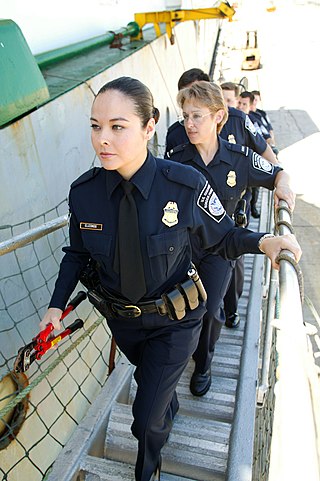
The federal government of the United States empowers a wide range of federal law enforcement agencies to maintain law and public order related to matters affecting the country as a whole.
The United States Department of the Navy's Multiple Threat Alert Center (MTAC) provides indications and warning for a wide range of threats to Navy and Marine Corps personnel and assets around the world.
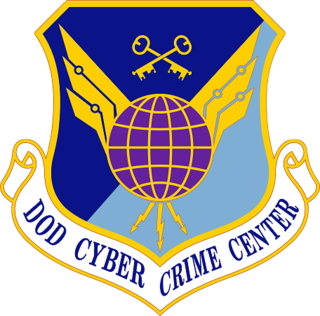
The Department of Defense Cyber Crime Center (DC3) is designated as a Federal Cyber Center by National Security Presidential Directive 54/Homeland Security Presidential Directive 23, as a Department of Defense (DoD) Center Of Excellence for Digital and Multimedia (D/MM) forensics by DoD Directive 5505.13E, and serves as the operational focal point for the Defense Industrial Base (DIB) Cybersecurity program. DC3 operates as a Field Operating Agency (FOA) under the Inspector General of the Department of the Air Force.

The United States Marine Corps Criminal Investigation Division is a federal law enforcement agency that investigates crimes against people and property within the United States Marine Corps.

The Department of the Army Civilian Police (DACP) are the civilian federal law enforcement bodies of the Department of the Army of the United States of America. There is no centralized DACP agency, with all civilian law enforcement agencies of the Army falling under the “DACP” title. The DACP are controlled jointly by the Department of the Army and the Department of Defense and as such, they are commonly referred to as DoD Police.

The Commander of the Office of Special Investigations (OSI/CC) heads the Office of Special Investigations (OSI) and derives its independent criminal investigative authority directly from the Secretary of the Air Force. OSI is also a field operating agency under the administrative guidance and oversight of the Inspector General of the Department of the Air Force.
The United States Department of the Navy Police is the uniformed law enforcement branch of the United States Navy. It provides professional, civilian, federal police officers, to serve and protect U.S. Navy personnel and installations. They work primarily alongside U.S. Navy Masters-at-Arms, the military police of the U.S. Navy.
















